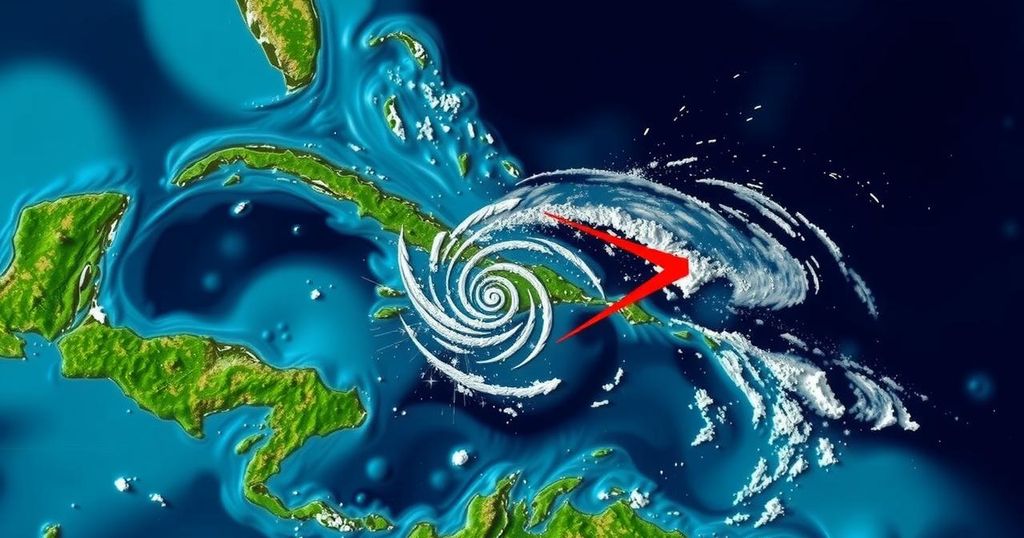Tropical Storm Oscar is advancing towards the Bahamas after striking Cuba as a Category 1 hurricane, resulting in at least six fatalities due to heavy rainfall and flooding. Positioned nearly 45 miles from the Bahamas on Tuesday morning, Oscar exhibits winds of 40 mph while moving at a rate of 12 mph. It has been noted as the smallest recorded hurricane and caused significant rain in Cuba, presenting risks of flooding and landslides. The ongoing Atlantic hurricane season is predicted to be above average, emphasizing the necessity for proactive measures against potential storm threats.
Tropical Storm Oscar is currently progressing towards the Bahamas following its landfall in Cuba as a Category 1 hurricane, resulting in at least six fatalities due to severe weather conditions. On Tuesday morning, Oscar was situated approximately 45 miles (75 kilometers) south-southeast of Long Island, Bahamas, exhibiting sustained winds of 40 mph (65 kph) and a movement trajectory of north-northeast at 12 mph (19 kph), as reported by the National Hurricane Center based in Miami. At this stage, the storm was deemed as barely maintaining its tropical storm status. Forecasts indicated that Oscar could produce rainfall amounts reaching 5 inches (13 centimeters) across the southeastern Bahamas, with isolated areas potentially receiving up to 8 inches (20 centimeters). Consequently, a tropical storm warning has been issued for the central and southeastern Bahamas. Remarkably, Oscar is noted as the smallest recorded hurricane on record, with a wind field spanning a mere 6 miles (10 kilometers). It made landfall unexpectedly on Grand Inagua Island in the Bahamas on Saturday and struck eastern Cuba late on Sunday. Hurricane specialist Michael Lowry commented on the forecasting failures that allowed Oscar to escalate to hurricane strength, remarking, “It’s not often we see a colossal failure in hurricane forecasting,” as no predictive models foresaw such a development. In eastern Cuba, Oscar resulted in significant rainfall, with at least 15 inches (38 centimeters) measured on Monday, prompting warnings of potential flooding and landslides, particularly affecting the region of Guantánamo where the six deaths were reported. This timely weather event coincides with Cuba’s efforts to recover from a widespread power outage that has sparked minor protests, with the government issuing stern warnings against civil unrest. Oscar is identified as the 15th named storm and 10th hurricane of the ongoing Atlantic hurricane season, which officially runs from June 1 to November 30. The National Oceanic and Atmospheric Administration has forecasted a likelihood of an above-average hurricane season this year, due in part to exceptionally warm ocean temperatures, predicting between 17 to 25 named storms and four to seven major hurricanes of Category 3 or greater classification. In parallel, Tropical Storm Kristy was observed over open waters in the Pacific, found approximately 375 miles (605 kilometers) west-southwest of Acapulco, Mexico, with maximum sustained winds reaching 50 mph (85 kph). Kristy is anticipated to achieve hurricane status by Tuesday night.
The trajectory and impact of Tropical Storm Oscar and the subsequent climatic conditions in the region are significant aspects of current meteorological concerns within the Atlantic hurricane season. Understanding these storms becomes crucial, particularly with the backdrop of global warming and its correlation with increasing hurricane intensities and frequencies. These weather phenomena not only affect local populations but also highlight the necessity for advanced forecasting methods to predict hurricane developments accurately and mitigate their destructiveness. The discussion surrounding Oscar’s unexpected rise to hurricane status brings attention to potential improvements in predicting such climatic events.
In summary, Tropical Storm Oscar’s journey towards the Bahamas following its landfall in Cuba as a hurricane serves as a reminder of the unpredictability of storm forecasts and the severe consequences they can entail. The storm, now diminished to tropical storm status, inflicted substantial rainfall and loss of life in Cuba while prompting warnings in the Bahamas. Moreover, with the projection of an active Atlantic hurricane season, it underlines the importance of preparedness and advanced meteorological approaches, especially concerning the impacts of climate change on storm behaviors.
Original Source: www.usnews.com






